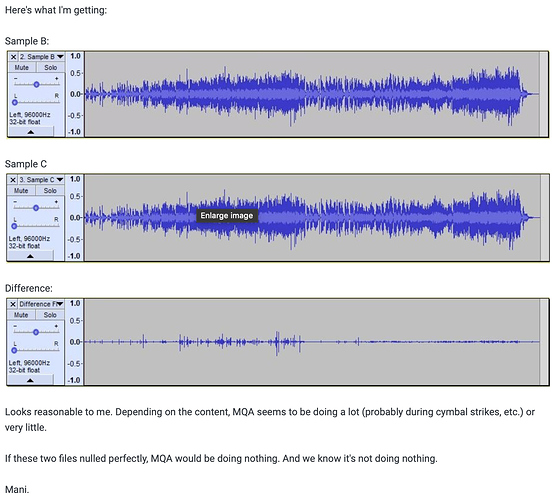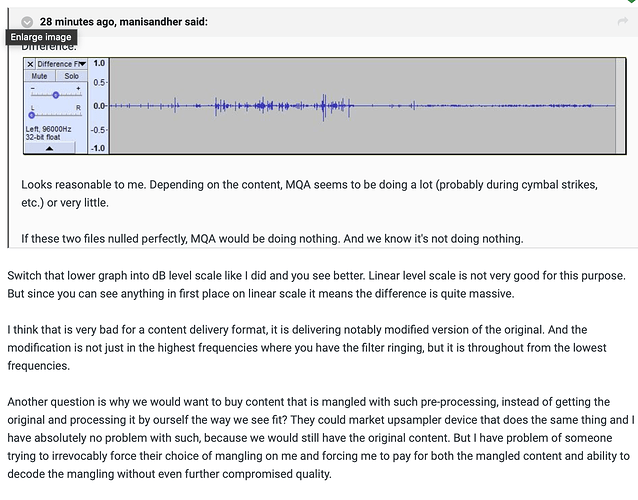No lack of hyperbole here. ![]()
That’s where MQA really scores IMO - streaming, especially if your network is a little sluggish.
As for the SQ of MQA, I’m on the fence at the mo’. I’m just not sure if it sounds any better (or any worse, for that matter) than Hi-Rez streams from Qobuz.
BUT in sluggish networks, MQA is a no-brainier.
Really Scores what - 1 out of 10? MQA lossy compression is terribly inefficient compared to MP3 or apple AAC despite being invented decades after other leading lossy compression algorithms.
MQA Technology is amazing NOT!
When I said MQA ‘scores’, I meant that it’s useful in low-band networks/applications because the file size is much smaller than the equivalent High-res file.
MQA has ‘it’s place’ IMO. Just ‘don’t believe the hype’!
That depends on what you are using as a comparison. A very interesting post is the following:
My point is that AAC at 256kbps sounds great for use over limited bandwidth.
MQA at the equivalent of 1411kbps and with only 18 or less bits is neither a good compression algorithm nor a high resolution stream…is it good for anything at all?
Listening to music when there’s little else available?
The ‘audiophile in a hotel or marginal connection’ use case is a stretch. First, would not 16/44 PCM in a flac container, at almost half the needed bandwidth, be the solution? How does a lossy, compressed facimilia of 24/96 (so really only about 17 bits, 1 more than 16/44, and lossy 48>96 at that) while also requiring proprietary hardware/software, artist/studio/label/consumer lock in…this is the a solution to a marginal wifi in a hotel? 18/96 PCM would give us everything MQA does technically (1 more bit, no lossy compression) at the same bandwidth without the proprietary hardware/software costs, if this was really a problem worth tackling. Not that it is…
For some albums the redbook version is the same master and I find CD quality perfectly acceptable. But in several cases I found the CD version of the album available on Tidal was not the same master and many times these are inferior reproductions.
No, the Tidal streams are all listenable as they play without interruption. I may be misreading you but this question seems to imply that “a night in the hotel” is not a session where I should care for sound quality. I sometimes travel with my Meze 99 Classics headphones and a the Oppo HA-2SE portable DAC/amp (specially if it is an extended trip.) While clearly this isn’t a high-end setup, it certainly allows me to appreciate music at a quality that satisfies my tastes and it is something I often like to treat myself to after a long day of work. In this setup I can definitely tell the difference between different masters and I appreciate I can have access to better masters streamed by Tidal using MQA.
No, I don’t think my comparison was hyperbole. I contrasted a flawlessly functional streaming service (Tidal with MQA) to one that did not work at all in my use case (Qobuz with Hi-Res). I properly caveated my observation as applicable to a specific use case where bandwidth is limited (in a hotel wifi network). I’m not docking Qobuz at all–I’ve been beta-testing the service at home and generally like what I hear, the access to album booklets, etc. But, in this case hi-res stream did not work for me. Any number divided by zero is infinity…therefore, Tidal with MQA was infinitely better in this case. I thought it was an apt contrast.
The other point I was trying to make is there’s been much debate in this thread about distortions and filter impacts which I find are orders of magnitude lower than other effects such as quality of headphones, DAC/amp, etc. and certainly irrelevant when the hi-res stream will not even play.
That may be. I’ve never cared to fully define the attribute “audiophile” nor do I think I ever will so it is possible you are correct. However, I doubt I’m the only professional that travels and would like to enjoy a quality listening session in the comfort of a hotel room after a long day of work.
16/44 PCM would indeed be perfectly acceptable to me if it contained the same master available in MQA or Hi-Res distributions. I can never hear the difference due to the bit losses you noted.
Is there a streaming service that provides this option? You may be right noting there isn’t a viable market for this kind of service–I don’t have the marketing data to refute your assertion but I don’t think you have it either to back it up. Regardless, I wasn’t trying to make an economic case for MQA. I was simply noting that for my specific use the Tidal MQA solution offered something I could not get through any other streaming service.
On the one hand, your “contrasting” two encodings, MQA and hi res (represented by Tidal and Qobuz). On the other hand, your contrasting two (or more) differing masterings, which just happen to be inside differing encodings (MQA, and/or 16/44 or hi res).
Two different issues which are too easily conflated. You like certain masterings as do I. For example, I prefer the mastering of the Dead’s ‘American Beauty’ inside the Tidal MQA encoding to the one inside the 16/44 one. However, it is incorrect to say that I prefer MQA. The mastering is independent of MQA, as is my preference.
So I don’t think you intended to, but what you said I think, at least in part, conflated the two issues: masterings and their sound, and MQA vs. 16/44 vs hi res and the pros/cons of these encodings.
A better master is a very good reason.
The best master is always in my storage at home and never from a streamed source. Apple music is more than sufficient when I travel until Roon gives me options for my personal collection on the road.
By the way, this conflation of mastering and encoding is part of the genius of Bob S/MQA marketing efforts…I will say it again, Bob S. deeply understood the audiophile end of the business…
A pity he doesn’t understand the negative impact of phase distortion or leaky apodizing filters. A pity that what MQA call de-blurring is actually temporal blurring and distortion.
Yes, I’m aware these are different issues which I often see conflated in these discussions. I may have not been explicit enough in my comments. I’ve found through trial and error that many of the digital hi-res PCM offerings in Qobuz streaming and through purchase/download outlets like HDTracks and ProStudioMasters are the same masters being offered in Tidal MQA. So when I was comparing Qobuz with Tidal I was using what I thought was the same master.
I am not an MQA zealot and I can’t say I’ve found any evidence their signal processing methods offer any sound quality advantage over straight-up PCM though I’ve never listened to MQA beyond the software decoding offered by the Tidal app and Roon on a relatively mid-fi system. However, in the use case I noted the Tidal MQA encoding/streaming service delivered high-quality masters through a setup I enjoy listening with.
On this one we are in 100% agreement! Great album.
I agree with this as well.
Yes, I also enjoy using Apple Music and often do when I go on short trips and I’m traveling light. I’ll just take my Bose QC35s and Bluetooth AAC from my iPhone. Works very well and delivers pretty good quality.
I too look forward to a mobile Roon solution! Then I’ll know for sure which master I’m streaming and likely won’t need more than CD quality or even 320 kbps when traveling.
Not to beat a dead horse, but there’s another caveat, which is that the use case you’re describing is applicable to THAT room in THAT hotel. A bit more bandwidth, and Qobuz would’ve been fine. A bit less, and Tidal wouldn’ve worked.
I’ve travelled quite a bit, and my conclusion this far is that the one way to reliably do audiophilia or cinephilia is a hard drive. Just don’t rely on someone else’s infrastructure. Anything else is hit or miss, even if things have gotten better… I was surprised I could comfortably zip accross France streaming RedBook FLAC from a Plex server the other day, for example.
Qobuz Hi-Res requires a minimum internet speed of around 20Mbps and most low cost budget hotels offered free internet around 3 to 5Mbps. Though this is barely enough to stream Redbook, it is more for MP3 streaming. Just because you can’t stream Qobuz Hi-Res doesn’t mean it can be dismissed based of lack of bandwidth. If you want good quality stuffs prepared to pay more, that’s my argument.
I think the point is MQA worked Qobuz didn’t. It just happens to be a real life experience, whereas a lot of what is discussed here is theory ie filtering as opposed to what is heard. So by all means point out how rare the situation may be but it actually happened…
This is exactly the use case MQA was developed for. Stream “almost hires” over a limited bandwidth. I fully agree with erich6 and for me streaming MQA without dropouts is clearly superior to streaming uncompressed hires with dropouts.
Having said that, if I DO have enough bandwidth I will take the full, uncompressed hires over MQA anytime (unless a superior master is available only via Tidal/MQA)
Here’s an interesting NULL comparison of MQA vs 24/96 same master:
Jussi’s reply:
https://audiophilestyle.com/forums/topic/30381-mqa-is-vaporware/?do=findComment&comment=937903

